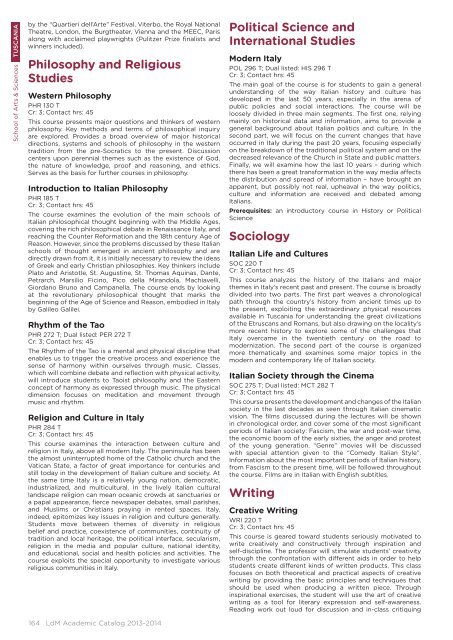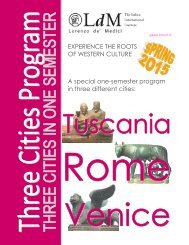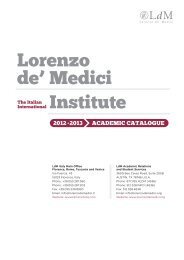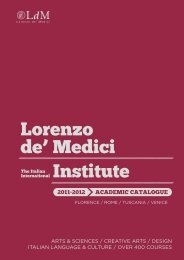aCademiC Catalog 2013-2014 - Lorenzo de Medici
aCademiC Catalog 2013-2014 - Lorenzo de Medici
aCademiC Catalog 2013-2014 - Lorenzo de Medici
Create successful ePaper yourself
Turn your PDF publications into a flip-book with our unique Google optimized e-Paper software.
School of Arts & Sciences TUSCANIA<br />
by the “Quartieri <strong>de</strong>ll’Arte” Festival, Viterbo, the Royal National<br />
Theatre, London, the Burgtheater, Vienna and the MEEC, Paris<br />
along with acclaimed playwrights (Pulitzer Prize finalists and<br />
winners inclu<strong>de</strong>d).<br />
Philosophy and Religious<br />
Studies<br />
Western Philosophy<br />
PHR 130 T<br />
Cr: 3; Contact hrs: 45<br />
This course presents major questions and thinkers of western<br />
philosophy. Key methods and terms of philosophical inquiry<br />
are explored. Provi<strong>de</strong>s a broad overview of major historical<br />
directions, systems and schools of philosophy in the western<br />
tradition from the pre-Socratics to the present. Discussion<br />
centers upon perennial themes such as the existence of God,<br />
the nature of knowledge, proof and reasoning, and ethics.<br />
Serves as the basis for further courses in philosophy.<br />
Introduction to Italian Philosophy<br />
PHR 185 T<br />
Cr: 3; Contact hrs: 45<br />
The course examines the evolution of the main schools of<br />
Italian philosophical thought beginning with the Middle Ages,<br />
covering the rich philosophical <strong>de</strong>bate in Renaissance Italy, and<br />
reaching the Counter Reformation and the 18th century Age of<br />
Reason. However, since the problems discussed by these Italian<br />
schools of thought emerged in ancient philosophy and are<br />
directly drawn from it, it is initially necessary to review the i<strong>de</strong>as<br />
of Greek and early Christian philosophies. Key thinkers inclu<strong>de</strong><br />
Plato and Aristotle, St. Augustine, St. Thomas Aquinas, Dante,<br />
Petrarch, Marsilio Ficino, Pico <strong>de</strong>lla Mirandola, Machiavelli,<br />
Giordano Bruno and Campanella. The course ends by looking<br />
at the revolutionary philosophical thought that marks the<br />
beginning of the Age of Science and Reason, embodied in Italy<br />
by Galileo Galilei.<br />
Rhythm of the Tao<br />
PHR 272 T; Dual listed: PER 272 T<br />
Cr: 3; Contact hrs: 45<br />
The Rhythm of the Tao is a mental and physical discipline that<br />
enables us to trigger the creative process and experience the<br />
sense of harmony within ourselves through music. Classes,<br />
which will combine <strong>de</strong>bate and reflection with physical activity,<br />
will introduce stu<strong>de</strong>nts to Taoist philosophy and the Eastern<br />
concept of harmony as expressed through music. The physical<br />
dimension focuses on meditation and movement through<br />
music and rhythm.<br />
Religion and Culture in Italy<br />
PHR 284 T<br />
Cr: 3; Contact hrs: 45<br />
This course examines the interaction between culture and<br />
religion in Italy, above all mo<strong>de</strong>rn Italy. The peninsula has been<br />
the almost uninterrupted home of the Catholic church and the<br />
Vatican State, a factor of great importance for centuries and<br />
still today in the <strong>de</strong>velopment of Italian culture and society. At<br />
the same time Italy is a relatively young nation, <strong>de</strong>mocratic,<br />
industrialized, and multicultural. In the lively Italian cultural<br />
landscape religion can mean oceanic crowds at sanctuaries or<br />
a papal appearance, fierce newspaper <strong>de</strong>bates, small parishes,<br />
and Muslims or Christians praying in rented spaces. Italy,<br />
in<strong>de</strong>ed, epitomizes key issues in religion and culture generally.<br />
Stu<strong>de</strong>nts move between themes of diversity in religious<br />
belief and practice, coexistence of communities, continuity of<br />
tradition and local heritage, the political interface, secularism,<br />
religion in the media and popular culture, national i<strong>de</strong>ntity,<br />
and educational, social and health policies and activities. The<br />
course exploits the special opportunity to investigate various<br />
religious communities in Italy.<br />
Political Science and<br />
International Studies<br />
Mo<strong>de</strong>rn Italy<br />
POL 296 T; Dual listed: HIS 296 T<br />
Cr: 3; Contact hrs: 45<br />
The main goal of the course is for stu<strong>de</strong>nts to gain a general<br />
un<strong>de</strong>rstanding of the way Italian history and culture has<br />
<strong>de</strong>veloped in the last 50 years, especially in the arena of<br />
public policies and social interactions. The course will be<br />
loosely divi<strong>de</strong>d in three main segments. The first one, relying<br />
mainly on historical data and information, aims to provi<strong>de</strong> a<br />
general background about Italian politics and culture. In the<br />
second part, we will focus on the current changes that have<br />
occurred in Italy during the past 20 years, focusing especially<br />
on the breakdown of the traditional political system and on the<br />
<strong>de</strong>creased relevance of the Church in State and public matters.<br />
Finally, we will examine how the last 10 years – during which<br />
there has been a great transformation in the way media affects<br />
the distribution and spread of information – have brought an<br />
apparent, but possibly not real, upheaval in the way politics,<br />
culture and information are received and <strong>de</strong>bated among<br />
Italians.<br />
Prerequisites: an introductory course in History or Political<br />
Science<br />
Sociology<br />
Italian Life and Cultures<br />
SOC 220 T<br />
Cr: 3; Contact hrs: 45<br />
This course analyzes the history of the Italians and major<br />
themes in Italy’s recent past and present. The course is broadly<br />
divi<strong>de</strong>d into two parts. The first part weaves a chronological<br />
path through the country’s history from ancient times up to<br />
the present, exploiting the extraordinary physical resources<br />
available in Tuscania for un<strong>de</strong>rstanding the great civilizations<br />
of the Etruscans and Romans, but also drawing on the locality’s<br />
more recent history to explore some of the challenges that<br />
Italy overcame in the twentieth century on the road to<br />
mo<strong>de</strong>rnization. The second part of the course is organized<br />
more thematically and examines some major topics in the<br />
mo<strong>de</strong>rn and contemporary life of Italian society.<br />
Italian Society through the Cinema<br />
SOC 275 T; Dual listed: MCT 282 T<br />
Cr: 3; Contact hrs: 45<br />
This course presents the <strong>de</strong>velopment and changes of the Italian<br />
society in the last <strong>de</strong>ca<strong>de</strong>s as seen through Italian cinematic<br />
vision. The films discussed during the lectures will be shown<br />
in chronological or<strong>de</strong>r, and cover some of the most significant<br />
periods of Italian society: Fascism, the war and post-war time,<br />
the economic boom of the early sixties, the anger and protest<br />
of the young generation. “Genre” movies will be discussed<br />
with special attention given to the “Comedy Italian Style”.<br />
Information about the most important periods of Italian history,<br />
from Fascism to the present time, will be followed throughout<br />
the course. Films are in Italian with English subtitles.<br />
Writing<br />
Creative Writing<br />
WRI 220 T<br />
Cr: 3; Contact hrs: 45<br />
This course is geared toward stu<strong>de</strong>nts seriously motivated to<br />
write creatively and constructively through inspiration and<br />
self-discipline. The professor will stimulate stu<strong>de</strong>nts’ creativity<br />
through the confrontation with different aids in or<strong>de</strong>r to help<br />
stu<strong>de</strong>nts create different kinds of written products. This class<br />
focuses on both theoretical and practical aspects of creative<br />
writing by providing the basic principles and techniques that<br />
should be used when producing a written piece. Through<br />
inspirational exercises, the stu<strong>de</strong>nt will use the art of creative<br />
writing as a tool for literary expression and self-awareness.<br />
Reading work out loud for discussion and in-class critiquing<br />
164<br />
LdM Aca<strong>de</strong>mic <strong>Catalog</strong> <strong>2013</strong>-<strong>2014</strong>





